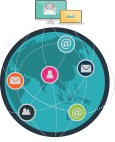As a freelance writer, it is your job to tell a story that readers are willing to spend a few minutes of their day engaged with. To do that effectively, you’ve got to gather data, do a fair amount of research on your topic, create a few visuals to help enhance your story, and possibly even conduct an interview.
It’s important to understand, of course, the purpose of the interview. It isn’t merely to gather a couple of quotes that prop up your story’s main idea.
Why interviews are necessary
Interviews serve a number of purposes, the first of which is to add credibility to your own byline. Today’s readers understand that you are probably not an expert on every topic you write about. Even if you are, it helps to get another person’s perspective. This solidifies in the reader’s mind that you did your homework.

Beyond that, interviews add depth to your story. You could just write a narrative and be done, but that would be boring. Anyone who has ever finished a novel can tell you that some of the most engaging parts of the story were the moments of dialogue between the characters. When done right, dialogue makes the story more compelling and drives the story forward in a way that merely describing events cannot do.
Something else that interviews do is to help you better understand the material so that you can explain it in detail to your reader. This is very important for complex topics about which you may know little. Believe me, your reader will know.
Meeting with your interviewee
Today, technology makes interviewing experts for any story much more accessible than before. In the past, you had two options: Meet in person or call on a landline. Today, there are a myriad of communication devices on which you can conduct an interview. But not all technology is created equal in this regard.
 E-mail interviews are two dimensional. They don’t allow you to dialogue with the interviewee. You must paste all of your questions in the body of an e-mail and wait for the expert to respond. If you want to ask a follow-up question, you’ll have to send another e-mail. This is inefficient and will more often than not lend itself to a sub-par interview. For that reason, I don’t recommend it.
E-mail interviews are two dimensional. They don’t allow you to dialogue with the interviewee. You must paste all of your questions in the body of an e-mail and wait for the expert to respond. If you want to ask a follow-up question, you’ll have to send another e-mail. This is inefficient and will more often than not lend itself to a sub-par interview. For that reason, I don’t recommend it.
 Veteran interviewer Morgan Ramsay agrees. In answer to a question on Quora he said, “Never communicate with anyone about anything without the possibility of emotion. You must hear how what they say is said; otherwise, you’re able to report only the what and that makes your work one-dimensional and far more likely to be removed from context.”
Veteran interviewer Morgan Ramsay agrees. In answer to a question on Quora he said, “Never communicate with anyone about anything without the possibility of emotion. You must hear how what they say is said; otherwise, you’re able to report only the what and that makes your work one-dimensional and far more likely to be removed from context.”
While Mr. Ramsay’s answer was in the minority of Quorans who answered the question, his was the only response that provided advantages for both e-mail and telephone interviews.
As an e-mail alternative, set up a time to speak with your expert in a medium that will allow two-way dialogue. If you need to ask for clarification on something the expert says, you can do that without a time lapse that eats away precious time.
My recommended media for conducting expert interviews include:

- Telephone (landline or mobile)
- Skype
- Google+ Hangout
- Instant chat
- Web conference
- Video chat
When possible, use a visual medium so that you can receive visual communication cues. If that is not possible, then opt for a voice medium. Chat sessions should be used only as a last resort.
Preparing for the interview
It is very important that you prepare adequately for every interview. You do not want to waste time him-hawing around while asking questions. You should respect the time of the expert you are interviewing.
- Start by gathering your background information. Research your topic first. That way, you have a good handle on the material before you talk to your experts.
- After you’ve gathered some background research and identified the experts you want to interview, make a list of questions you want to ask the interviewee. Put your most pressing questions at the front of your list so you can ask them first. That way, if you have to cut the interview short for any reason, the most important questions are out of the way.
- While conducting the interview, look for opportunities to ask follow-up questions. These are spontaneous questions you’ll ask based on something the interviewee said earlier. You’ll often get your best quotes from these questions.
When all is said and done, interviewing experts takes preparation. You can’t just call an expert out of the blue and expect the interview to go well. Do your due diligence and you’ll find that the stories you tell take on an added dimension, one with depth and greater power.
About the author:
Allen Taylor is a freelance writer, professional blogger, and award-winning journalist living in Pennsylvania. At Taylored Content he blogs about digital publishing. He is also the editor and publisher at Garden Gnome Publications, a digital publisher specializing in e-books within the speculative fiction genre. When he isn’t cruising the job boards he is burning up Facebook with lyrical absurdisms. He also publishes three #twitpoem daily at Twitter.
Also by Allen Taylor:
6 Essential Job Boards for Any Freelance Writer (article)



